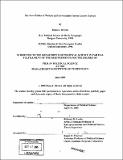The new politics of welfare in post-socialist Central Eastern Europe
Author(s)
Brown, Dana L., Ph. D. Massachusetts Institute of Technology
DownloadFull printable version (21.34Mb)
Alternative title
new politics of welfare reform in post-communist Europe
Other Contributors
Massachusetts Institute of Technology. Dept. of Political Science.
Advisor
Richard M. Locke.
Terms of use
Metadata
Show full item recordAbstract
This dissertation explores the evolution of welfare systems in post-socialist countries. Utilizing a range of data on social policy legislation and outcomes across countries, the author shows the extent to which post-socialist welfare systems vary in their design and effects. Variation is demonstrated using six indicators that measure: the extent of universality of social benefits, active policies, effective redistribution, wage-based financing of social programs, benefit levels and familization. Cross-country variation has occurred in spite of the common experiences of opening their economies to international competition and in spite of political pressure from international organizations and the European Union to adopt similar, pre-packaged policy agendas. To explain this variation, the author uses case studies of unemployment and family policies in the Czech Republic, Hungary and Poland, to argue that domestic policy actors in each country make the critical decisions about welfare reform. Comparative case analyses show that the direction of welfare reform in the post-communist countries was largely set in place during the few years following regime change in each of them. (cont.) At this time, domestic institutions involved in policy formation were vested with particular inclinations regarding the objectives of state welfare, and certain capacities to implement social programs. Over time, the interaction between three domestic institutions - political parties, interest groups and welfare bureaucracies - has led to the perpetuation of unique policy arrays in each country. The development of welfare systems in the post-communist countries is therefore shown to be path-dependent, with the critical juncture occurring immediately after regime change, roughly between 1989 and 1993. The mechanism by which policy directions are perpetuated over time is the interaction between key domestic institutions, each of whose repertoires of potentially acceptable policies is delimited by its characteristic inclinations and capacities.
Description
Thesis (Ph. D.)--Massachusetts Institute of Technology, Dept. of Political Science, 2005. Vita. Includes bibliographical references (p. 296-304).
Date issued
2005Department
Massachusetts Institute of Technology. Department of Political SciencePublisher
Massachusetts Institute of Technology
Keywords
Political Science.